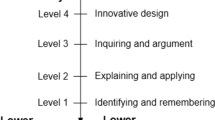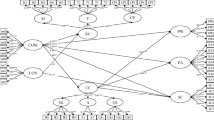Abstract
This study investigated the relationship between adult self-efficacy in science and scientific competencies of Taiwanese citizens. Probability proportional to size sampling was used to select 1830 participants between the ages of 18 and 70. The research methods employed was survey research; analysis was conducted using hierarchical regression analysis. The results indicated that gender and self-efficacy have an explanatory power for scientific competencies. The predictive power of self-efficacy for scientific competencies was different for male and female groups. This study proposes several suggestions regarding science education policies in accordance with the research findings.

Similar content being viewed by others
References
Bandura, A. (1986). Social foundations of thought and action. New York, NY: Prentice-Hall.
Bandura, A. (1997). Self-efficacy: The exercise of control. New York, NY: W. H. Freeman.
Bauer, M. W., Allum, N., & Miller, S. (2007). What can we learn from 25 years of PUS survey research? Liberating and expanding the agenda. Public Understanding of Science, 16(1), 79–95.
Benjamin, T. E., Marks, B., Demetrikopoulos, M. K., Rose, J., Pollard, E., Thomas, A., & Muldrow, L. L. (2017). Development and validation of scientific literacy scale for college preparedness in STEM with freshmen from diverse institutions. International Journal of Science and Mathematics Education, 15(4), 607–623.
Brotman, J. S., & Moore, F. M. (2008). Girls and science: A review of four themes in the science education literature. Journal of Research in Science Teaching, 45(9), 971–1002.
Chin, C. C., Yang, W. C., & Tuan, H. L. (2016). Argumentation in a socioscientific context and its influence on fundamental and derived science literacies. International Journal of Science and Mathematics Education, 14(4), 603–617.
Chiu, H. C. (2010). Quantitative research and statistical analysis in social & behavioral sciences. Taipei, Taiwan: Wunan Publications.
Cross, S. (2009). Adult teaching and learning: Developing your practice. Maidenhead: McGraw Hill.
Du, J., & MacEachern, S. N. (2008). Judgement post-stratification for designed experiments. Biometrics, 64(2), 345–354.
Falk, J. H., & Needham, M. D. (2013). Factors contributing to adult knowledge of science and technology. Journal of Research in Science Teaching, 50(4), 431–452.
Falk, J. H., Storksdieck, M., & Dierking, L. D. (2007). Investigating public science interest and understanding: Evidence for the importance of free-choice learning. Public Understanding of Science, 16(4), 455–469.
Fang, Z. (2013). Disciplinary literacy in science: Developing science literacy through trade books. Journal of Adolescent & Adult Literacy, 57(4), 274–278.
Fenichel, M., & Schweingruber, H. A. (2010). Surrounded by science: Learning science in informal environments. Washington, DC: National Academies Press.
Hammond, C., & Feinstein, L. (2005). The effects of adult learning on self-efficacy. London Review of Education, 3(3), 265–287.
Hardin, E. E., & Longhurst, M. O. (2016). Understanding the gender gap: Social cognitive changes during an introductory STEM course. Journal of Counseling Psychology, 63(2), 233–239.
Jack, B. M., Lin, H. S., & Yore, L. D. (2014). The synergistic effect of affective factors on student learning outcomes. Journal of Research in Science Teaching, 51, 1084–1101. https://doi.org/10.1002/tea.21153.
Jameson, M. M., & Fusco, B. R. (2014). Math anxiety, math self-concept, and math self-efficacy in adult learners compared to traditional undergraduate students. Adult Education Quarterly, 64, 306–322.
Kıran, D., & Sungur, S. (2012). Middle school students’ science self-efficacy and its sources: Examination of gender difference. Journal of Science Education and Technology, 21(5), 619–630.
Legewie, J., & DiPrete, T. A. (2014). The high school environment and the gender gap in science and engineering. Sociology of Education, 87(4), 259–280 https://doi.org/10.1177/0038040714547770.
Lin, H. S. (2010). A survey on civic scientific literacy (NSC 98-2511-S-110-005). Kaohsiung City, Taiwan: Center for General Education, National Sun Yat-sen University.
Lin, H. S., Hong, Z. R., & Huang, T. C. (2012). The role of emotional factors in building public scientific literacy and engagement with science. International Journal of Science Education, 34(1), 25–42.
Lin, H. S., Lawrenz, F., Lin, S. F., & Hong, Z. R. (2013). Relationships among affective factors and preferred engagement in science-related activities. Understanding of Science, 22(8), 941–954.
Linacre, J. M., & Wright, B. D. (1994). Reasonable mean-square fit values. Rasch Measurement Transactions, 8(3), 370.
McCarthy, R. R., & Berger, J. (2008). Moving beyond cultural barriers: Successful strategies of female technology education teachers. Journal of Technology Education, 19(2), 65–79.
Miller, J. D. (2004). Public understanding of, and attitudes toward, scientific research: What we know and what we need to know. Public Understanding of Science, 13(3), 273–294.
Organisation for Economic Co-Operation and Development (2009). PISA 2006 technical report. Paris, France: Author.
Organisation for Economic Co-Operation and Development (2010). PISA 2009 assessment framework: Key competencies in reading, mathematics and science. Paris, France: Author.
Organisation for Economic Co-Operation and Development (2013). PISA 2015 draft science framework. Paris: Author.
Organisation for Economic Co-Operation and Development (2016). PISA 2015 Results (Volume I). Paris, France: Author.
Porras-Hernandez, L. H., & Salinas-Amescua, B. (2012). Nonparticipation in adult education from self-perceptions to alternative explanations. Adult Education Quarterly, 62(4), 311–331.
Pyo, J. (2016). Bridging in-school and out-of-school literacies. Journal of Adolescent & Adult Literacy, 59(4), 421–430.
Rasch, G. (1960). Probabilistic models for some intelligence and attainment tests. Chicago, IL: The University of Chicago Press.
Sarkar, M., & Corrigan, D. (2014). Bangladeshi science teachers’ perspectives of scientific literacy and teaching practices. International Journal of Science and Mathematics Education, 12(5), 1117–1141.
Sandlin, J. A., Wright, R. R., & Clark, C. (2013). Reexamining theories of adult learning and adult development through the lenses of public pedagogy. Adult Education Quarterly, 63(1), 3–23.
Snow, C. E., & Dibner, K. A. (2016). Science literacy: Concepts, contexts, and consequences. Washington, DC: The National Academies Press.
Sjøberg, S. (2015). PISA and global educational governance: A critique of the project, its uses and implications. Eurasia Journal of Mathematics, Science and Technology Education, 11, 111–127.
Stine-Morrow, E. A. L., & Parisi, J. M. (2011). The adult development and cognition and learning. In K. Rubenson (Ed.), Adult learning and education (pp. 41–46). Saint Louis, MO: Academic Press.
Tsai, C. Y., Li, Y. Y., & Cheng, Y. Y. (2017). The relationships among adult affective factors, engagement in science, and scientific competencies. Adult Education Quarterly, 67(1), 30–47.
Tsai, C. Y., Shien, P. P., Jack, B. M., Wu, K. C., Chou, C. Y., Wu, Y. Y., Liu, C. J., Chiu, H. L., Hung, J. F., Chao, D., & Huang, T. C. (2012). Effects of exposure to pseudoscientific television programs upon Taiwanese citizens’ pseudoscientific beliefs. International Journal of Science Education, Part B, 2(2), 175–194.
Tsai, L. T., Yang, C. C., & Chang, Y. J. (2015). Gender differences in factors affecting science performance of eighth grade Taiwan students. Asia-Pacific Education Researcher, 24(2), 445–456.
Tomasi, D., & Volkow, N. D. (2011). Laterality patterns of brain functional connectivity: Gender effects. Cerebral Cortex, 22(6), 1455–1462.
Tsui, M., Xu, X., Venator, E., & Wang, Y. (2016). Stereotype threat and gender: Math performance in Chinese college students. Chinese Sociological Review, 48(4), 297–316.
Velayutham, A. J. M., & Fraser, B. (2012). Gender differences in student motivation and self-regulation in science learning: A multi-group structural equation modeling analysis. International Journal of Science and Mathematics Education, 10(6), 1347–1368.
Vygotsky, L. (1986). Thought and language (translation newly revised and edited by Alex Kozulin). Cambridge, MA: The MIT Press.
Wang, Y. H. (2012). The dominant sex dominates technology? An interpretation of the gendered-technology phenomenon. Chinese Journal of Science Education, 20(3), 241–265.
Wang, M.-T., & Degol, J. L. (2017). Gender gap in science, technology, engineering, and mathematics (STEM): Current knowledge, implications for practice, policy, and future directions. Educational Psychology Review, 29(1), 119–140.
Waugh, R. F., & Addison, P. A. (1998). A Rasch measurement model analysis of the revised approaches to studying inventory. British Journal of Educational Psychology, 68, 95–112.
Weisgram, E. S., & Bigler, R. S. (2005). Girls and science careers: The role of altruistic values and attitudes about scientific tasks. Journal of Applied Developmental Psychology, 27, 326–348.
Woods-McConney, A., Oliver, M. C., McConney, A., Schibeci, R., & Maor, D. (2014). Science engagement and literacy: A retrospective analysis for students in Canada and Australia. International Journal of Science Education, 36(10), 1588–1608.
Xu, Y. (2015). Focusing on women in STEM: A longitudinal examination of gender-based earning gap of college graduates. The Journal of Higher Education, 86(4), 489–523.
Zeldin, A. L., Britner, S. L., & Pajares, F. (2008). A comparative study of the self-efficacy beliefs of successful men and women in mathematics, science, and technology careers. Journal of Research in Science Teaching, 45(9), 1036–1058.
Zeldin, A., & Pajares, F. (2000). Against the odds: Self-efficacy beliefs of women in mathematical, scientific, and technological careers. American Educational Research Journal, 37(1), 215–246.
Acknowledgments
The work reported here was supported by the Ministry of Science and Technology, Taiwan, under grants NSC 101-2511-S-110-007-MY3. The authors also greatly appreciate the valuable suggestions of Prof. Huann-shyang Lin and the journal reviewers and editors.
Author information
Authors and Affiliations
Corresponding author
Electronic supplementary material
ESM 1
(PDF 115 kb)
Rights and permissions
About this article
Cite this article
Tsai, CY., Huang, TC. The Relationship Between Adult Self-Efficacy and Scientific Competencies: the Moderating Effect of Gender. Int J of Sci and Math Educ 16 (Suppl 1), 91–106 (2018). https://doi.org/10.1007/s10763-017-9869-4
Received:
Accepted:
Published:
Issue Date:
DOI: https://doi.org/10.1007/s10763-017-9869-4




